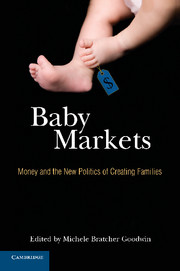Book contents
- Frontmatter
- Contents
- Preface
- Acknowledgments
- Introduction
- PART ONE WHAT MAKES A MARKET? EFFICIENCY, ACCOUNTABILITY, AND RELIABILITY OR GETTING THE BABIES WE WANT
- PART TWO SPACE AND PLACE: REPRODUCING AND REFRAMING SOCIAL NORMS OF RACE, CLASS, GENDER, AND OTHERNESS
- PART THREE SPECTRUMS AND DISCOURSES: RIGHTS, REGULATIONS, AND CHOICE
- PART FOUR THE ETHICS OF BABY AND EMBRYO MARKETS
- PART FIVE TENUOUS GROUNDS AND BABY TABOOS
- Author Bios
- Index
PART THREE - SPECTRUMS AND DISCOURSES: RIGHTS, REGULATIONS, AND CHOICE
Published online by Cambridge University Press: 05 August 2012
- Frontmatter
- Contents
- Preface
- Acknowledgments
- Introduction
- PART ONE WHAT MAKES A MARKET? EFFICIENCY, ACCOUNTABILITY, AND RELIABILITY OR GETTING THE BABIES WE WANT
- PART TWO SPACE AND PLACE: REPRODUCING AND REFRAMING SOCIAL NORMS OF RACE, CLASS, GENDER, AND OTHERNESS
- PART THREE SPECTRUMS AND DISCOURSES: RIGHTS, REGULATIONS, AND CHOICE
- PART FOUR THE ETHICS OF BABY AND EMBRYO MARKETS
- PART FIVE TENUOUS GROUNDS AND BABY TABOOS
- Author Bios
- Index
Summary
Most of us in this generation grew up believing that we had fantastic, unlimited, freedom of choice. Yet as mothers many women face “choices” on the order of: You can continue to pursue your professional dreams at the cost of abandoning your children to long hours of inadequate child care. Or: You can stay at home with your baby and live in a state of virtual, crazy-making isolation because you can't afford a nanny, because there is no such thing as part-time day care, and because your husband doesn't come home until 8:30 at night.
– Judith Warner, Newsweek, February 21, 2005In Part Three, authors address the thorny issues of privacy, human rights, legal regulation, and choice. These issues expose conflicts of interest that might arise between new parents and their children, in gay parent adoption, in the use of human eggs for scientific research, and in the ethics of using life sources outside of the context of parenting. Do free markets really translate to free choice? Maybe not, but as we have come to see, reproductive markets help individuals who otherwise see their natural rights to parent limited either due to infertility or sexuality. Questions of whether there are limits to free choice and a need for more law in the parenting domain are discussed here.
- Type
- Chapter
- Information
- Baby MarketsMoney and the New Politics of Creating Families, pp. 145 - 146Publisher: Cambridge University PressPrint publication year: 2010



